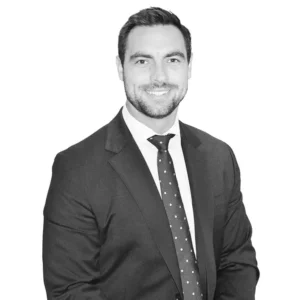Here’s a stroll down memory lane…
I remember the exact conversation I had with my good friend Dustin when I decided that I wanted to work in the finance industry. I told him that I wanted to go back to school and focus my studies on finance. His response, “Why?” My answer, “I don’t know… just sounds interesting.” In reality, though, I did know why, I’d seen a lot of the damage that financial illiteracy can cause – bankruptcy, divorce, etc. and I wanted to get a grasp on how money works.
So, the journey began…
I had an insatiable appetite to learn everything I could about finance. I finished my graduate degree concentrating my studies in finance, I completed the Certified Financial Planner™ designation, and read everything I could get my hands on that had anything to do with investing, planning, etc.
I remember starting my career at Morgan Stanley and befriending another new hire that had some prior experience in the industry. I leaned on him like a safari guide to show me the books to read and articles to devour – I wanted to know everything I could. He lent me a copy of his favorite book, Little Book of Common Sense Investing: The Only Way to Guarantee Your Fair Share of Stock Market Returns by Jack Bogle. Bogle, the founder of Vanguard, is often credited as being the founding father of Index Funds.
My friend treated this book as gospel and his own investment strategy reflected what he was calling, “passive investing.” A new term to me. So, I quickly read the book to see what all the excitement was about. Bogle was a great author, presented everything in an easy to understand format, and I enjoyed the read. Little did I know that this book and this topic would lead to so much debate.
“So… what’d you think? Great book, right? Life-changing, yes?” exclaimed my giddy co-worker. “It was good… he’s a great writer and really advocates for investors – I liked it.” I replied. Perhaps my response was underwhelming because we went on to spend the next couple of years discussing our interpretations of this book and debating this topic of active vs. passive investing. A debate that wasn’t unique to us, one that the whole financial world continues to engage in.
Let me give you some background on what these terms mean. A passive investor is one that would pick an investment strategy that mimics that of a market index (S&P 500, Dow Jones, Nasdaq, etc.). They are defining this approach as “passive” because they are not actively deciding from the investable universe what to own and how much to own of it. Active investing, on the other hand, would be the intentional process of deciding what to own and what not to own, as well as for deciding what proportion to own of each investment.
Being Passive Aggressive
Here was the core of my frustration and the impetus for our debate – my friend was making a claim to be passive, yet I would argue that he wasn’t passive at all. I argued that in fact, we are all active investors. I’ll say it again, we are all active investors. Just to note, calling a self-proclaimed “passive investor” an “active investor” is an unfathomable insult – not sure why, but it is.
In his book, Bogle presented a philosophy of investing and he approached it academically, which I found very educational. I took a lot away from this book and many others that I’ve read by Jack Bogle. Here’s the problem though, theory and application are very different. My friend may believe he is philosophically a “passive” investor, but I will tell you in practice he is absolutely an active investor.
Remember, the key definition of passive investing means that you don’t have any influence over how your portfolio is allocated. The true passive investor would essentially own the global market portfolio, with allocations to everything from real estate to commodities to bitcoin and they would own them proportionally based on the size of each respective market. Honestly, something not even very easy to execute from a portfolio construction process.
Now, let me tell you what most passive investors do in practice, my friend included. They find an investment strategy they align with – sometimes this is ever-changing – and they express this strategy by actively building a portfolio using index funds to create the desired exposures. So, for my friend, he was a disciple of the Noble Prize-winning work of Eugene Fama and Kenneth French. Fama and French published their academic study theorizing the benefits of owning small companies and companies that trade at a price relatively low compared to their book value (a financial metric). So, my friend built a portfolio using index funds and tilting (overweighting) his exposures to small value companies based on the work of Fama and French. My friend is an active investor.
Here’s the thing, there really is no in-between, it is black and white. You are either an active investor or a passive investor. You can’t be a little bit pregnant.
Let’s take Jack Bogle as an example, who I do absolutely admire for the incredible impact he has had on our industry. Jack was not a passive investor. Jack allocated money to his son’s hedge fund, not a passive allocation. Jack proclaimed his personal portfolio as 50% equities and 50% bonds, again an active decision to come to this allocation conclusion. Is this a bad thing? No, absolutely not. Our investment strategy should actively represent our beliefs, values, goals, aspirations, etc. We should tailor our approach to what best fits our own needs and desires.
If I am being honest, my real pet peeve is the arrogance that is often associated with the passive community. An aura of ultimate sophistication and anyone outside of the passive belief system should be looked down upon as unenlightened. I am just here to challenge all of us to be intellectually honest in the fact that we are all active and that’s ok.
Now, why would I be writing about my pet peeve to my TOM audience? Because I believe that you will interact with a passive evangelist in your own investing journey and I want you to be well-equipped. To be comfortable in the active construction of your personal portfolio. As I said, you have goals and dreams, you have resources that represent your hard work, and you should feel 100% comfortable believing that those resources deserve the attention and care of a carefully and intentionally constructed portfolio.
That’s it.
We will be back next week with more of my Thoughts on Money.





